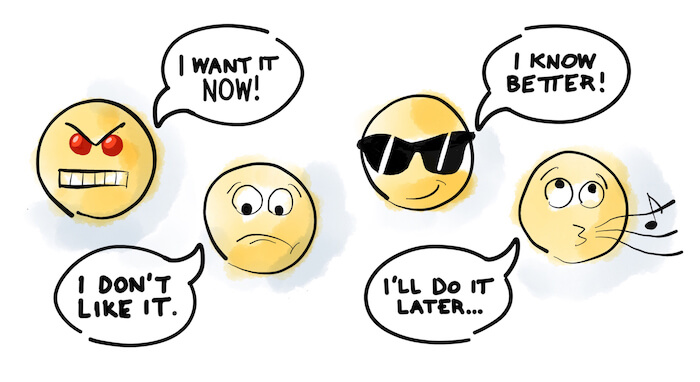Imagine for a moment you are a remote employee. You have a big presentation in a couple of hours and your supervisor, who is located a couple of time zones away, sends you a meeting request. She wants to have a personal conference with you by the end of the week. End of message.
What happens? Negativity bias starts to kick in. Your stress levels rise. You brain is flooded with cortisol. You start saying to yourself, “This cannot be good. What did I do wrong? Let me back track through my recent emails and conversations with the team. What could this be about?”
You get distracted. Your brain energy becomes depleted because you are multitasking. You are thinking about your important presentation at hand and worrying about your supervisor’s anxieties at the same time.
I took a risk. I called my supervisor’s cell phone that day and asked if her concerns could be dealt with immediately. To my surprise, she took my call.
It was not an easy conversation. Yet, we had a major breakthrough. We both agreed that if future crises ever arose between the two of us, we would contact each other by phone as soon as possible. Timing of our concerns did not matter. We agreed that our virtual doors would be open regardless of the unpredictability of our issues.
Without realizing it, my supervisor and I had created the framework for what Mark Goulston, psychiatrist and author of the book “Just Listen” would call a wince conversation.
A wince conversation is essentially a permission slip for an upcoming difficult dialogue. According to Goulston, it is a critical tool for leaders regarding the delegation of tasks and responsibilities to their team. It can also be useful in setting the ground rules for courageous conversations.
Goulston recommends that we have a clear understanding of how we like to be confronted with difficult issues. Some folks want an email notification. Others may desire a telephone conversation. Direct types my need a face to face discussion.
A wince conversation may go something like this. The boss knocks on the door of their employee’s office and says, “Remember when we agreed about how I would contact you about the timeliness of your projects? Well, it is a couple of days late and (after wincing) I really need this deliverable completed. Can we chat?”
Difficult conversations? No problem. Just pick up the phone.





I recommend the book “How to Break Bad News: A Guide for Health Care Professionals”, by the late Rob Buckman ( https://jhupbooks.press.jhu.edu/content/how-break-bad-news ). As an oncologist, you can imagine he had a great many bits of bad news to convey. The principles readily transfer from health care settings to just about any organization.